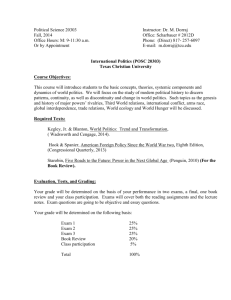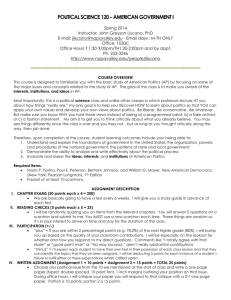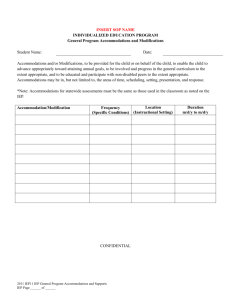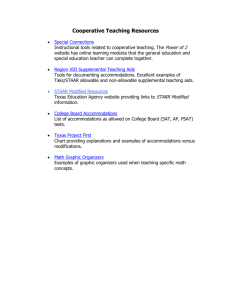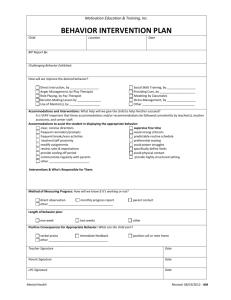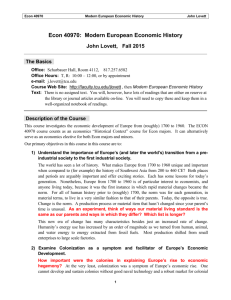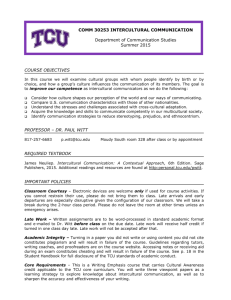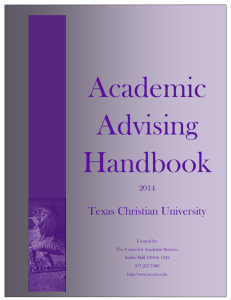Topics in Comparative Politics
advertisement
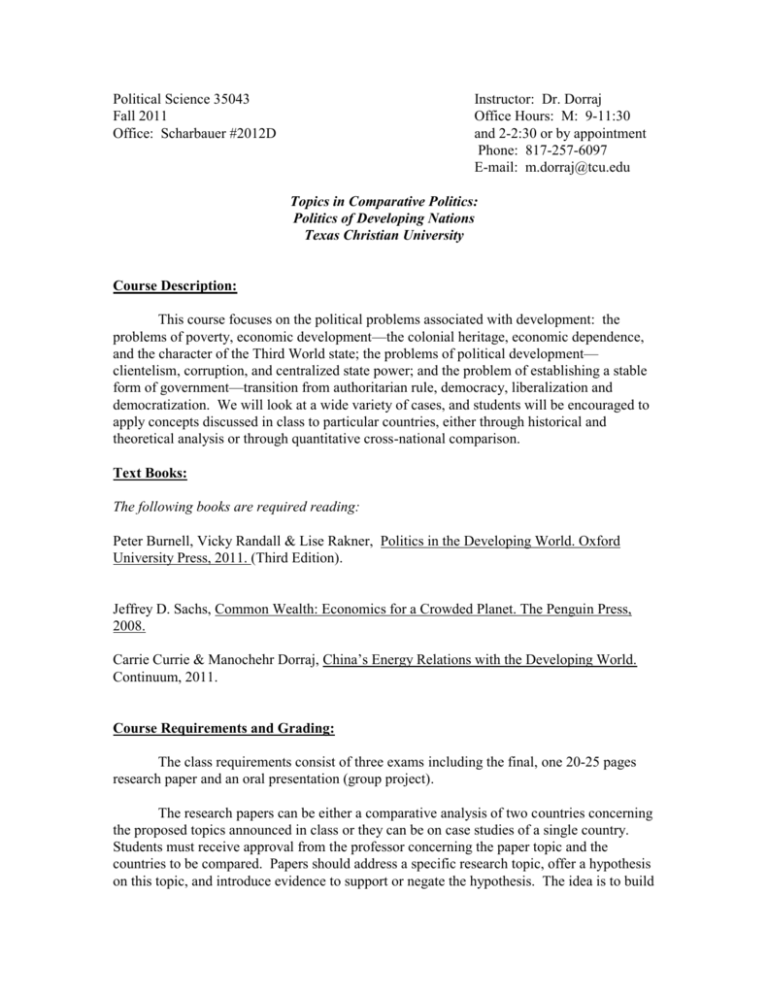
Political Science 35043 Fall 2011 Office: Scharbauer #2012D Instructor: Dr. Dorraj Office Hours: M: 9-11:30 and 2-2:30 or by appointment Phone: 817-257-6097 E-mail: m.dorraj@tcu.edu Topics in Comparative Politics: Politics of Developing Nations Texas Christian University Course Description: This course focuses on the political problems associated with development: the problems of poverty, economic development—the colonial heritage, economic dependence, and the character of the Third World state; the problems of political development— clientelism, corruption, and centralized state power; and the problem of establishing a stable form of government—transition from authoritarian rule, democracy, liberalization and democratization. We will look at a wide variety of cases, and students will be encouraged to apply concepts discussed in class to particular countries, either through historical and theoretical analysis or through quantitative cross-national comparison. Text Books: The following books are required reading: Peter Burnell, Vicky Randall & Lise Rakner, Politics in the Developing World. Oxford University Press, 2011. (Third Edition). Jeffrey D. Sachs, Common Wealth: Economics for a Crowded Planet. The Penguin Press, 2008. Carrie Currie & Manochehr Dorraj, China’s Energy Relations with the Developing World. Continuum, 2011. Course Requirements and Grading: The class requirements consist of three exams including the final, one 20-25 pages research paper and an oral presentation (group project). The research papers can be either a comparative analysis of two countries concerning the proposed topics announced in class or they can be on case studies of a single country. Students must receive approval from the professor concerning the paper topic and the countries to be compared. Papers should address a specific research topic, offer a hypothesis on this topic, and introduce evidence to support or negate the hypothesis. The idea is to build an argument and then defend it. Papers must show original research, i.e. you must offer substantial evidence beyond that gained through class readings or class notes. Papers must also be original relative to this class: you cannot use a paper from another class to receive credit in this class. Style and punctuation are taken into account in grading the paper: your argument is only as strong as your ability to communicate it. Papers must be typed, doublespaced, regular size 12 font, and must use a standard form of footnoting or endnoting. The paper topics will be announced in class. You must use at least 15 sources (books and Journal articles) to substantiate your analysis in your research paper. The exams include both objective items (such as short identifications) and subjective items (such as short and long essay questions.) Students are held responsible for both theory and country-specific information. Moore instructions would be provided in class on this assignment. Oral presentations are based on group project from Carrie &Dorraj book, China’s Energy Relations with the Developing World. I strongly recommend class participation. Excessive absence will adversely affect your grade. Make-up exam will be given only for medical excuses with proper documentation. Grading: The final grade will be calculated by weighing the class requirements in the following manner: Exam 1 Exam 2 Exam 3 Research Paper Oral presentation 20% 20% 20% 30% 10% TOTAL 100% Disability Statement and Services Texas Christian University complies with the Americans with Disabilities Act and Section 504 of the Rehabilitation Act of 1973 regarding students with disabilities. Eligible students seeking accommodations should contact the Coordinator of Services for Students with Disabilities in the Center for Academic Services located in Sadler Hall, 11. Accommodations are not retroactive, therefore, students should contact the Coordinator as soon as possible in the term for which they are seeking accommodations. Further information can be obtained from the Center for Academic Services, TCU Box 297710, Fort Worth, TX 76129, or at (817) 257-7486. Adequate time must be allowed to arrange accommodations and accommodations are not retroactive; therefore, students should contact the Coordinator as soon as possible in the academic term for which they are seeking accommodations. Each eligible student is responsible for presenting relevant, verifiable, professional documentation and/or assessment reports to the Coordinator. Guidelines for documentation may be found at http://www.acs.tcu.edu/DISABILITY.HTM. Students with emergency medical information or needing special arrangements in case a building must be evacuated should discuss this information with their instructor/professor as soon as possible. Academic Misconduct According to Section 3.4 of the Student Handbook, “any act that violates the academic integrity of the institution is considered academic misconduct.” Procedures used to resolve suspected acts of academic misconduct are available in the offices of the academic deans and the Office of Campus Life. Specific Examples include but are not limited to: Cheating: Copying from another student’s test paper, other report or computer files and listings; using during any academic exercise material and /or devices not authorized by the person in charge of the test; collaborating with or seeking aid from another student during at test; knowingly using, buying, selling, stealing, transporting or soliciting in its entirety or in part, the contents of a test or other assignment unauthorized for release; substituting for another student or permitting another student to substitute for oneself. Plagiarism: The appropriation, theft, purchase or use by any means of another person’s work and unacknowledged submission or incorporation of that work as one’s own work offered for credit. Appropriation includes quoting or purchasing another’s work without giving credit. Collusion: Unauthorized collaboration with another person in preparing work offered for credit. Academic dishonesty and the detection of plagiarism would result in your failing the course. TCU has the software Turn it in available to its faculty that allows them to detect the research papers or book reviews that are download from the internet or cut and paste from other sources without attribution. Make up exams Would be given only to those students with a legitimate medical excuse. Students demanding a make up exam must show documentations from a physician attesting to their illness. DATES ASSIGNMENTS Week 1 Introduction to Politics of Developing Nations a. What is development and underdevelopment b. Poverty and development Burnell & Randall& Rakner (B,R & R) PP:1-10. Weeks 2 Theories of development and underdevelopment: contending Analytical Approaches a. b. c. d. Modernization Theory Dependency Theory Globalization Theory Alternatives to development theories (B, R &R) PP:15-35 Weeks 3 Historical context : the legacy of colonialism and post-Colonial economic patterns of development. (B, R &R) PP: 36-70. Week 4 The Developing World in the Global Economy (B, R, & R) PP: 71-88 Week 4 The Developing World in International Politics (B, R &R): PP:89-105 Week 5 Inequality in the Developing world: Its causes, different manifestations and consequences (B, R &R): PP:109-126. ** EXAM 1, Thursday, September 22nd ** Week 6, 7 Issues in political development a. EthnoPolitics and Nationalism b. Culture and Religion c. Women and Gender (B, R &R): PP: 127-181. Week 8, 9 The nature of the Third World State and its management a. The character of the Third World State: Decolonization and the rise of the post-colonial state b. The roots of the Third World Authoritarianism c. Third World Revolutions d. The rise of civil society and “People’s power” Viewing of “The Mind of Hussein ( B, R &R): 182- 256. Weeks 10 Political and economic changes in the Third World a. Dynamics of transition from authoritarian rule b. Democracy and democratization: Causes and preconditions, obstacles and prospects c. Democratization and inequality (B, R &R): 257-276. ** EXAM 2, Tuesday, October 25th ** The Emergence of China and its engagement of the Developing World: What it portends for the Future Oral Presentations are based on the book China’s Energy Relations with the Developing World and it begins on Tuesday, November 1st. Group Assignment on Oral Presentations would be made in Class. Weeks 11, 12, 13: Oral Presentations Start Reading Sach’s book, The Common Wealth. The entire book. Thanks Giving Recess: Nov 23-27th. Weeks 14, 15 The Third World in a Changing World: Meeting the Challenges of an Interdependent World a. The Challenge of Economic Development and Overcoming Poverty. b. Providing security and fostering good governance. c. Demographic Challenges. d. Environmental Challenges. (B, R &R): 316-372 Read Sachs : The entire book Research Papers are due: Tuesday, Dec 1st. ** FINAL EXAM, Thursday, Dec 15th, 8-10:30 **
